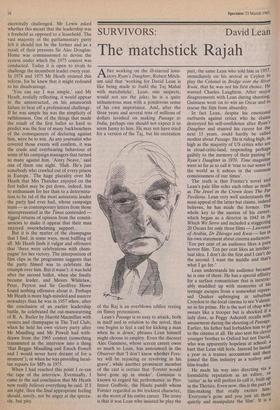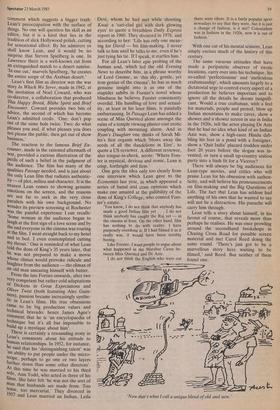The matchstick Raj ah
After working on the ill-starred love- story Ryan's Daughter, Robert Mitch- um said that 'working for David Lean is like being made to build the Taj Mahal with matchsticks'. Lean, one suspects, would not see the joke; he is a quite unhumorous man with a ponderous sense of his own importance. And, after the three years and several tens of millions of dollars lavished on making Passage to India, perhaps one should not expect it to seem funny to him. He may not have tried for a version of the Taj, but his recreation
of the Raj is an overblown edifice resting on flimsy pretensions.
Lean's Passage is so easy to attack, both in itself and in relation to the novel, that one begins to feel a cad for kicking a man when he is down: phrases Lean himself might choose to employ. Even the discreet Alec Guinness, whose screen career owes so much to Lean, has announced in the Observer that 'I don't know whether Fors- ter will be rejoicing or revolving in his grave', while another prominent member of the cast is certain that 'Forster would have gone up in smoke'. Guinness is known to regard his performance as Pro- fessor Godbole, the Hindu pandit whom Forster regarded as his trickiest character, as the worst of his entire career. The irony is that it was Lean who insisted he play the part, the same Lean who told him in 1957, immediately on his arrival in Ceylon to play the Colonel in Bridge over the River Kwai, that he was not his first choice. He wanted Charles Laughton. After major disagreements with Lean during shooting, Guinness went on to win an Oscar and to rescue the film from absurdity. In fact Lean, despite his emotional outbursts against critics who he claims destroyed his self-confidence after Ryan's Daughter and stunted his career for the next 15 years, could hardly be called modest about Passage. He is riding high, as high as the majority of US critics who are in cloud-critic-land, responding perhaps guiltily to the memory of their pasting of Ryan's Daughter in 1970. Time magazine went so far as to call it 'true to our sense of the world as it echoes in the common consciousness of our times'.
The truth is that Forster's novel and Lean's pale film echo each other as much as The Jewel in the Crown does The Far Pavilions. Lean very well understands the mass appeal of the latter but claims, indeed believes, he has made the former. The whole key to the success of his career, which began as a director in 1942 in In Which We Serve and included a staggering 20 Oscars for only three films — Lawrence of Arabia, Dr Zhivago and Kwai — lies in his own statement about cinema audiences. `Ten per cent of an audience likes a pure horror film. Ten per cent likes an intellec- tual idea. I don't do the first and I can't do the second. I want the middle and that's what I go for.' Lean understands his audience because he is one of them. He has a special affinity for a surface romanticism that is inextric- ably muddled up with memories of his teenage escapes from a somewhat repres- sed Quaker upbringing in suburban Croydon to the local cinema to see Valenti- no in his prime. He is the sort of chap who swears like a trooper but is shocked if a lady does, as Peggy Ashcroft recalls with amusement during the shooting of Passage. Earlier, his father had forbidden him to go to the cinema at all. He also sent his clever younger brother to Oxford but not David, who was apparently hopeless at school: a hurt that Lean still feels. Instead he lasted a year as a trainee accountant and then joined the film industry as a teaboy and film-loader.
He made his way into directing via a formidable reputation as an editor, or `cutter' as he still prefers to call it, built up in the Thirties. Even now, this is the part of film-making that really excites him. `Everyone's gone and you just sit there quietly and manipulate the film'. It is a comment which suggests a bigger truth: Lean's preoccupation with the surface of things. No one will question his skill as an editor, but it is a kind that lies in the tradition of slick Hollywood polish, cutting for sensational effect. By his admirers ye shall know Lean, and it would be no surprise that Steven Spielberg is one. In Lawrence there is a well-known cut from an extinguished match to a desert sunrise. In one cut,' marvels Spielberg, 'he creates the entire scope of the Arabian desert.'
Lean's first film as director was the war story In Which We Serve, made in 1942, at the invitation of Noel Coward, who was co-director, a collaboration that produced This Happy Breed, Blithe Spirit and Brief Encounter. Coward provides two bits of advice, the second of which has become Lean's admitted credo. 'One: don't pop out of the same hole twice. Two: do what pleases you and, if what pleases you does not please the public, then get out of show business.'
The reaction to the famous Brief En- counter, made in the rationed aftermath of war, provided a curious illustration of the perils of such a belief in the judgment of the audience. The film has many of the qualities Passage needed, and is just about the only Lean film that radiates authentic- ity — of plot, milieu and character. It is the nearest Lean comes to showing genuine emotions on the screen, and the reasons are not far to seek in the very close parallels with his own background. No wonder its preview screening at Rochester was the painful experience I_ can recalls: Some woman in the audience began to laugh at the first sign of a love scene and by the end everyone in the cinema was roaring at the film. I went straight back to my hotel and to bed. I even contemplated cutting my throat.' One is reminded of what Lean told the dons of King's 35 years later, that he was not prepared to make a movie whose climax would provoke ridicule and laughter from the audience — the climax of an old man smearing himself with butter. From the late Forties onwards, after two very competent but rather cold adaptations of Dickens in Great Expectations and Oliver Twist (both featuring Alec Guin- ness), passion became increasingly synthe- tic in Lean's films. His true obsessions came to be big production values and technical bravado: hence James Agee's comment that he is 'an encyclopaedia of technique but it's all but impossible to build up a mystique about him'. There is certainly a resounding irony in Lean's comments about his attitude to human relationships. In 1952, for instance, he said that his 'distinguishing talent' was an ability to put people under the micro- scope, perhaps to go one or two layers further down than some other directors'. At this time he was married to his third wife, Ann Todd, who acted in three of his films. She later felt 'he was not the sort of man that husbands are made from. Too tense, too mercurial.' They divorced in 1957 and Lean married an Indian, Leila Devi, whom he had met while shooting Kwai: a 'sari-clad girl with dark glowing eyes' to quote a breathless Daily Express report in 1960. They divorced in 1978, and according to her: 'Life has only one mean- ing for David — his film-making. I never talk to him until he talks to me, even if he's just tying his tie. If I speak, it startles him.' For all Lean's later epic probing of the human soul, which led the old Evening News to describe him, in a phrase worthy of Lord Gnome, as 'this shy, gentle, yet iron genius of the cinema', he has as much genuine insight into it as one of the stupider sahibs in Forster's novel whose blindness he believes Forster consistently overdid. His handling of love and sexual- ity, at least in his "later films, is painfully embarrassing. In Passage Lean has added a scene of Miss Quested alone amongst the ruins of a temple viewing plaster-cast erotic coupling with mounting alarm. And in Ryan's Daughter one thinks of Sarah Mi- les's first orgasm which 'blows away the seeds of all the dandelions in Eire', to quote a US reviewer. A different reviewer, also tongue-in-cheek, wrote: 'Where Fors- ter is mystical, devious and ironic, Lean is crisp, forthright and firm.' One gets the idea only too clearly from one interview which Lean gave to the Economist last year, in which appeared a series of banal and crass opinions which make one amazed at the gullibility of the dons of King's College, who control Fors- ter's estate.
`You know, I do not think that anybody has made a good Indian film yet . . I do not think anybody has caught the Raj yet — in the cinema at least. On the other hand, film has nothing to do with reality. I have purposely overdone it. If I had filmed it as it really was, it would have been terribly boring. Like Forster, I want people to argue about what happened in the Marabar Owes be- tween Miss Quested and Dr Aziz.
I do not think the English who were out there were idiots. It is a fairly popular sport nowadays to say that they were, but it is just a change of fashion, is it not? Colonialism was in fashion in the 1920s, now it is out of fashion.'
With one cut of his mental scissors, Lean simply excises much of the history of this century.
The same vacuous attitudes that have made a peripatetic observer of exotic locations, carry over into his technique, his so-called 'perfectionism' and 'meticulous craftsmanship', which amounts largely to a dictatorial urge to control every aspect of a production he believes important and to ignore all the details he deems insignifi- cant. Would a true craftsman, with a feel for materials, people and period, blow up Indian mountains to make caves, show a shower and a shower screen in use in India in the 1920s, tell the actor playing Dr Aziz that he had no idea what kind of an Indian Aziz was, show a high-caste Hindu dab- bling his feet in a pond with a foreigner, show a 'Quit India' placard trodden under foot 20 years before the slogan was in- vented, or turn a small up-country station party into a bash fit for a Viceroy?
There will always be big audiences for Lean-type movies, and critics who will praise Lean for his obsession with authen- ticity, and will believe his pronouncements on film-making and the Big Questions of 'Life. The fact that Lean has seldom had anything of his own that he wanted to say will not be a distraction. His panache will carry him through.
Lean tells a story about himself, in his favour of course, that reveals more than perhaps he realises. He was once prowling around the secondhand bookshops in Charing Cross Road for possible screen material and met Carol Reed doing the same round. 'There's just got to be a marvellous story here waiting to be filmed,' said Reed. But neither of them found one.
'Now that's what I call a unique blend of old and new.'















































 Previous page
Previous page